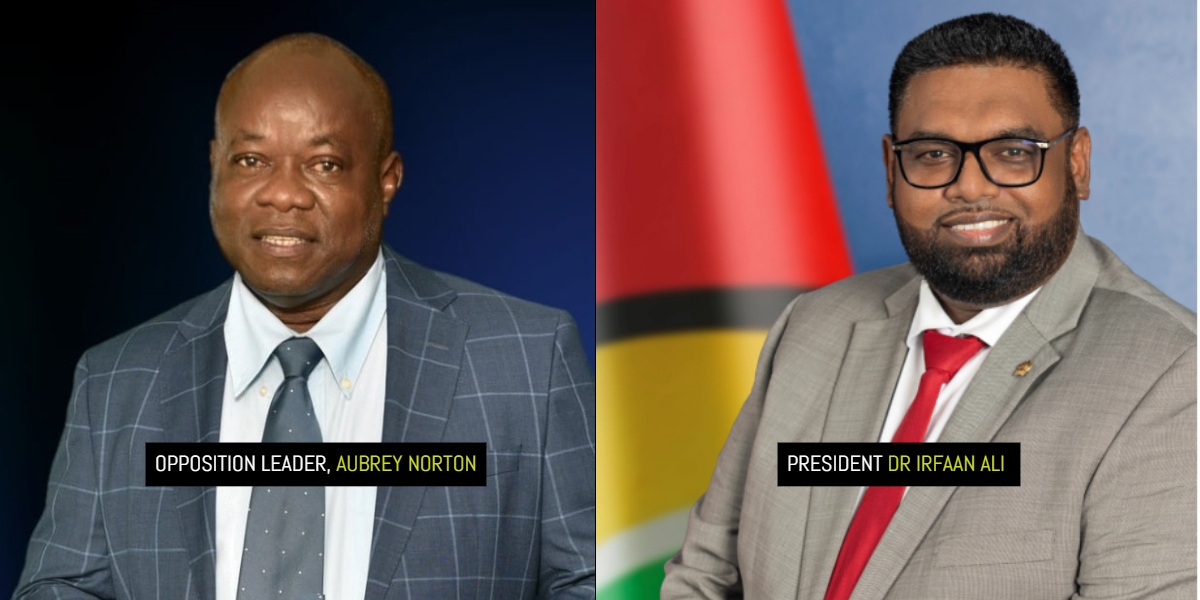By Staff Writer
Two bitter rival political behemoths that have held the reins of governance in Guyana at different intervals stretching well over half a century may have a chance at reconciliation. The remedy to this age-old rivalry, characterized by bloodshed, dangerous political maneuvering, and allegations of election rigging, lies in the simplest of human gestures – a handshake. At least, this is the literal interpretation of many on President Irfaan Ali’s commentary about his opposition counterpart, Aubrey Norton’s refusal to shake his hand.
Another segment of the population has interpreted Ali’s words as a metaphorical lamentation of the opposition’s supposed unwillingness to cooperate. This group argues that the president’s statement is a commentary on the lack of principles rather than a call for a literal handshake.
For context, this is what President Ali said in response to a question about his willingness or unwillingness to engage in a dialogue with the Opposition Leader: “I reached out and the man refused to shake my hands twice. What you want me to do, bow before him? He’s God? The Opposition Leader is not God”.
Regardless of one’s interpretation, the President’s remark sheds light on the acrimonious nature of politics in a nation with a population of about a million people.
President Irfaan Ali stated that he will not kowtow to Norton, a man who refused to shake his hand twice and acknowledge the administration as legitimate. He also mentioned Norton agreeing to have consultations on a matter and then resorting to the court to block said engagement. Furthermore, he stated that Norton and his party have refused to acknowledge the opposition’s role in attempting to rig the March 2020 General and Regional Elections.
For these reasons, Ali expressed doubts about Norton’s willingness to engage in meaningful and sincere discussions. He even called on the Opposition Leader and his party to “confess thy sins.” This confession has been labeled as a precondition for furthering opposition/government collaboration amid renewed calls for executive power-sharing.
Nonetheless, the President expressed his willingness to work with Norton, stating that all the Opposition Leader has to do is pick up the phone.
During a press conference today, the Opposition Leader stated that the last time he wrote to President Ali, regarding the confirmation of top judicial posts, he was met with “arrogance.” Norton informed the media that President Ali declared that only he could decide when the time was right to address these matters.
“The President’s attitude, amid his incompetence, is not something I am willing to condone,” Norton declared. The opposition leader also questioned Ali’s suitability to engage in talks with the A Partnership for National Unity + Alliance for Change (APNU+AFC) on behalf of the People’s Progressive Party/Civic (PPP/C).
“One has to wonder if talking to Irfaan Ali makes sense because, when you’re finished talking, Bharrat Jagdeo may not agree, and then you’ll have no movement…[Therefore], the PPP also needs to resolve the issue of where power lies,” Norton said.
Notably, the Opposition Leader, a self-proclaimed Political Scientist, chose not to offer his constituents, whom he claims are enduring oppression, a workable alternative to address their perceived subjugation in the absence of dialogue. To date, Norton has not outlined how he plans to get the President to the negotiating table, now that he has deemed Ali unfit to lead engagements with the opposition.
He maintains that the government is an “installed” one, with Ali as the chief oppressor. These claims have also contributed to the government’s reluctance to advance talks. The stalemate continues as the country edges towards becoming a global economic powerhouse thanks to its booming oil and gas sector.
The leader’s remarks come against the backdrop of Ali threatening to bypass the opposition if its politicians are hesitant to engage in talks. Ali stated that his party will work from the “bottom up,” explaining that the regime will directly engage with the people in opposition strongholds rather than attempting to meet in the middle with an unwilling opposition.













